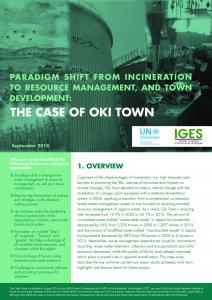Cognisant of the disadvantages of incineration (i.e. high disposal costs, barriers to promoting the 3Rs, overuse of resources and impacts on climate change), Oki Town decided to make a radical change with the installation of a biogas plant equipped with a methane fermentation system in 2006, sparking a transition from a conventional incineration-based waste management system to one focused on recycling-oriented resource management of organic waste.
As a result, Oki Town’s recycling rate increased from 14.9% in 2005 to 63.1% in 2015. The amount of incinerated waste (called “combustible waste” in Japan) by households decreased by 56% from 2,295 tonnes in 2005 to 1,007 tonnes in 2015, and the amount of landfilled waste (called “incombustible waste” in Japan) by households decreased by 98% from 98 tonnes in 2005 to 2 tonnes in 2015. Meanwhile, waste management expenditures (costs for incineration, recycling, waste water treatment, collection and transportation) and GHG emissions decreased, while the quality of life for local people improved, which plays a pivotal role in regional revitalisation.
This case study describes the key activities carried out, major results achieved, and main highlights and lessons learnt for future actions.

